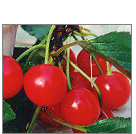 |
home > health benefits > antioxidants > what you need to know

What you need to know about antioxidants
Based on scientific evidence, daily antioxidant intake should increase to 3,000 to 5,000 ORAC units per day to reach a significant antioxidant capacity in blood plasma and other tissues. According to the U. S. Department of Agriculture (USDA), current intake is about 1,200 units per day.2
- Antioxidants provide benefits to virtually all the major systems of the body, including the cardiovascular system, the immune system and specific groups of nerve cells (neurons) in the brain. Antioxidants also can give protection against cancers and can help slow some steps in the aging process.3
- Free radicals are a major concern because they can reduce antioxidant activity. There are five basic types of damage caused by free radicals:
- Lipid peroxidation – free radicals initiate damage to fat compounds in the body, causing them to turn rancid and release more free radicals.
- Cross-linking – free radical reactions cause proteins and/or DNA molecules to fuse together.
- Membrane damage – free radical reactions destroy the integrity of the cell membrane, which in turn interferes with the cell’s ability to take in nutrients and expel wastes.
- Lysosome damage – free-radical reactions rupture lysosome cell (digestive particle) membranes; these then spill into the cell and digest critical cell compounds.
- Accumulation of the age pigment (lipofuscin), which may interfere with cell chemistry.4
- When oxygen free radicals outnumber the antioxidant activity, the result is an imbalance known as oxidative stress. This means that the free radicals can overpower the antioxidant potential and damage cells in the body. People produce more free radicals and fewer antioxidants as they age. This can potentially lead to mental and physical decline. The decrease in antioxidant production can begin as early as age 25. Many experts believe that people must eat antioxidant-rich foods, especially as they age, to maintain a high quality of life.5
2 Medicinal Food News, Volume 04, Issue 6.
3 All About Antioxidants,- David Felten, MD, PhD.
4 The Nutrition Superbook, The Antioxidants, 1995.
5 Excerpts from the speeches and writings of Dr. Russel Reiter, University of Texas Health Science Center in San Antonio, 2002-2004.
related articles:
Dried tart cherries mixed with cashews, smoked almonds or honey roasted peanuts make a great snack or appetizer for family or unexpected guests.
|
|






